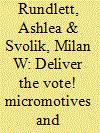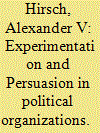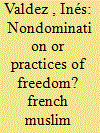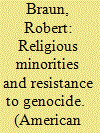|
|
|
Sort Order |
|
|
|
Items / Page
|
|
|
|
|
|
|
| Srl | Item |
| 1 |
ID:
145084


|
|
|
|
|
| Summary/Abstract |
The 2000 U.S. census was the first in which respondents were permitted to self-identify with more than one race. A decade later, multiple-race identifiers have become one of the fastest-growing groups in the nation. Such broadening multiracial identification poses important political ramifications and raises questions about the future of minority group political solidarity. Yet we know little about the opinions of multiple-race identifiers and from where those opinions emerge. Bridging literatures in racial politics and political socialization, and drawing upon a multimethod approach, this article provides insight into the consequences of the U.S.’s increasingly blurred racial boundaries by examining the attitudes of Americans of White-Black parentage, a population whose identification was traditionally constrained by the one-drop rule. Findings show that on racial issues such as discrimination and affirmative action, biracials who identify as both White and Black generally hold views akin to Blacks. But on nonracial political issues including abortion and gender/marriage equality, biracials who identify as White-Black or as Black express more liberal views than their peers of monoracial parentage. Being biracial and labeling oneself a racial minority is thus associated with a more progressive outlook on matters that affect socially marginalized groups. Two explanations are examined for these findings: the transmission of political outlook from parents to children, and biracials’ experiences straddling a long-standing racial divide.
|
|
|
|
|
|
|
|
|
|
|
|
|
|
|
|
| 2 |
ID:
145081


|
|
|
|
|
| Summary/Abstract |
States and aid agencies use employment programs to rehabilitate high-risk men in the belief that peaceful work opportunities will deter them from crime and violence. Rigorous evidence is rare. We experimentally evaluate a program of agricultural training, capital inputs, and counseling for Liberian ex-fighters who were illegally mining or occupying rubber plantations. Fourteen months after the program ended, men who accepted the program offer increased their farm employment and profits, and shifted work hours away from illicit activities. Men also reduced interest in mercenary work in a nearby war. Finally, some men did not receive their capital inputs but expected a future cash transfer instead, and they reduced illicit and mercenary activities most of all. The evidence suggests that illicit and mercenary labor supply responds to small changes in returns to peaceful work, especially future and ongoing incentives. But the impacts of training alone, without capital, appear to be low.
|
|
|
|
|
|
|
|
|
|
|
|
|
|
|
|
| 3 |
ID:
145092


|
|
|
|
|
| Summary/Abstract |
Most electoral fraud is not conducted centrally by incumbents but rather locally by a multitude of political operatives. How does an incumbent ensure that his agents deliver fraud when needed and as much as is needed? We address this and related puzzles in the political organization of electoral fraud by studying the perverse consequences of incentive conflicts between incumbents and their local agents. These incentive conflicts result in a herd dynamic among the agents that tends to either oversupply or undersupply fraud, rarely delivering the amount of fraud that would be optimal from the incumbent’s point of view. Our analysis of the political organization of electoral fraud explains why even popular incumbents often preside over seemingly unnecessary fraud, why fraud sometimes fails to deliver victories, and it predicts that the extent of fraud should be increasing in both the incumbent’s genuine support and reported results across precincts. A statistical analysis of anomalies in precinct-level results from the 2011–2012 Russian legislative and presidential elections provides preliminary support for our key claims.
|
|
|
|
|
|
|
|
|
|
|
|
|
|
|
|
| 4 |
ID:
145085


|
|
|
|
|
| Summary/Abstract |
Different beliefs about how to achieve shared goals are common in political organizations such as government agencies, campaigns, and NGOs. However, the consequences of such conflicts have not yet been explored. We develop a formal model in which a principal and an agent disagree about the right policy for achieving their shared goals. Disagreement creates a motivational problem, but we show how both observing policy outcomes and experimenting with policies can ameliorate it. We also show that the principal often defers to the agent in order to motivate him, thereby generating more informative policy outcomes and building future consensus. Most surprisingly, she sometimes allows the agent to implement his desired policy even when she is sure it is wrong, to persuade him through failure that he is mistaken. Using the model, we generate empirical implications about performance measurement and Presidential appointments in U.S. federal agencies.
|
|
|
|
|
|
|
|
|
|
|
|
|
|
|
|
| 5 |
ID:
145088


|
|
|
|
|
| Summary/Abstract |
Though more than 100 countries have adopted gender quotas, the effects of these reforms on women's political leadership are largely unknown. We exploit a natural experiment—a 50–50 quota imposed by the national board of the Swedish Social Democratic Party on 290 municipal branches—to examine quotas’ influence on women's selection to, and survival in, top political posts. We find that those municipalities where the quota had a larger impact became more likely to select (but not reappoint) female leaders. Extending this analysis, we show that the quota increased the number of women perceived as qualified for these positions. Our findings support the notion that quotas can have an acceleration effect on women's representation in leadership positions, particularly when they augment the pool of female candidates for these posts. These results help dispel the myth that quotas trade short-term gains in women's descriptive representation for long-term exclusion from political power.
|
|
|
|
|
|
|
|
|
|
|
|
|
|
|
|
| 6 |
ID:
145090


|
|
|
|
|
| Summary/Abstract |
My aim in this article is to show that there is distinctive normative value to thinking about a liberal polity as an agent with integrity that can be threatened, paralleling the integrity of an individual person. I argue that the idea of liberal integrity organizes and clarifies important moral intuitions concerning the policies of liberal democracies, especially with regard to their global conduct. This idea provides a novel organizing framework for liberal values that currently seem disparate. It also captures important moral intuitions as to how the tainted histories of actual liberal societies should bear on their global conduct. Finally, this idea explains, in a way that a simple appeal to familiar liberal values arguably cannot, why liberal polities have identity-based moral reasons not to entangle themselves in manifestly illiberal practices beyond their borders—reasons whose significance becomes apparent in scenarios and real-world cases that global political theory overlooks.
|
|
|
|
|
|
|
|
|
|
|
|
|
|
|
|
| 7 |
ID:
145082


|
|
|
|
|
| Summary/Abstract |
This article proposes a conception of freedom understood as practices. Based on Michel Foucault's work on the ethics of the self, I develop a conception of freedom that exceeds liberation and distinguishes between genuine practices of freedom and practices of the self that are unreflective responses to systems of government. I develop and illustrate this conception through an engagement with the recent French ban on full veils in public spaces and the ethnographic literature on European Muslim revival movements. I reconstruct how Muslim women relate to alternative discourses through specific practices of the self. These practices reveal that French Muslim women actively contest discourses of secularism and liberation that construct them as inherently passive and in need of tutelage. The conception I develop sheds light on some shortcomings of Philip Pettit's notion of freedom as nondomination. I argue that the proposed account is useful to, first, criticize the centrality of the opposition between arbitrary and nonarbitrary power in the definition of freedom. Second, I show that the predominant engagement with the external dimension of freedom in Pettit makes it difficult to capture the particular subjective practices that make up freedom and its development in the presence of power and/or attempts at domination.
|
|
|
|
|
|
|
|
|
|
|
|
|
|
|
|
| 8 |
ID:
145091


|
|
|
|
|
| Summary/Abstract |
Despite its prevalence, little is known about when parties buy turnout. We emphasize the problem of parties monitoring local brokers with incentives to shirk. Our model suggests that parties extract greater turnout buying effort from their brokers where they can better monitor broker performance and where favorable voters would not otherwise turn out. Exploiting exogenous variation in the number of polling stations—and thus electoral information about broker performance—in Mexican electoral precincts, we find that greater monitoring capacity increases turnout and votes for the National Action Party (PAN) and the Institutional Revolutionary Party (PRI). Consistent with our theoretical predictions, the effect of monitoring capacity on PRI votes varies nonlinearly with the distance of voters to the polling station: it first increases because rural voters—facing larger costs of voting—generally favor the PRI, before declining as the cost of incentivizing brokers increases. This nonlinearity is not present for the PAN, who stand to gain less from mobilizing rural voters.
|
|
|
|
|
|
|
|
|
|
|
|
|
|
|
|
| 9 |
ID:
145086


|
|
|
|
|
| Summary/Abstract |
Although scholarly consensus suggests that dissent causes repression, the behaviors are endogenous: governments and dissidents act in expectation of each other’s behavior. Empirical studies have not accounted well for this endogeneity. We argue that preventive aspects of repression meaningfully affect the relationship between observed dissent and repression. When governments use preventive repression, the best response to dissent that does occur is unclear; observed dissent does not meaningfully predict responsive repression. By contrast, governments that do not engage in ex ante repression will be more likely to do it ex post. We follow U.S. voting scholarship and propose a new instrument to model the endogeneity: rainfall. We couple rainfall data in African provinces and U.S. states with data on dissent and repression and find that dissent fails to have a significant effect on responsive repression in states that engage in preventive repression.
|
|
|
|
|
|
|
|
|
|
|
|
|
|
|
|
| 10 |
ID:
145089


|
|
|
|
|
| Summary/Abstract |
This article hypothesizes that minority groups are more likely to protect persecuted groups during episodes of mass killing. The author builds a geocoded dataset of Jewish evasion and church communities in the Netherlands during the Holocaust to test this hypothesis. Spatial regression models of 93 percent of all Dutch Jews demonstrate a robust and positive correlation between the proximity to minority churches and evasion. While proximity to Catholic churches increased evasion in dominantly Protestant regions, proximity to Protestant churches had the same effect in Catholic parts of the country. Municipality level fixed effects and the concentric dispersion of Catholicism from missionary hotbed Delft are exploited to disentangle the effect of religious minority groups from local level tolerance and other omitted variables. This suggests that it is the local configuration of civil society that produces collective networks of assistance to threatened neighbors.
|
|
|
|
|
|
|
|
|
|
|
|
|
|
|
|
| 11 |
ID:
145087


|
|
|
|
|
| Summary/Abstract |
The study of rhetoric has recently undergone a revival in political theory as a response to deliberative democratic approaches that value reason over affect in the political sphere. Most rhetorical revivalists look to Aristotle and develop accounts of ethos (character) that privilege the epistemic dimensions of trust, while overlooking the importance that considerations of propriety play in shaping the political speech of democratic leaders. We reconsider the rhetorical approach by integrating the regulative standards suggested by two political thinkers who also were theorists of rhetoric: Cicero and Adam Smith. Committed to character's role in collective judgment, Cicero and Smith both hold that sincerity and context shape decorum or propriety: Leaders rely on decorum to shape their rhetorical appeals, and audiences look to the fit between speech and character to gauge moral trustworthiness. Smith, however, goes beyond Cicero to develop a rhetorical theory more relevant for democracies by highlighting the importance of political context for rhetorical appeals and evaluations. We conclude by suggesting that attention to these components of decorum moves beyond Aristotelian accounts of rhetorical character in a way that is consistent with much empirical research on how voters judge the character of elected officials.
|
|
|
|
|
|
|
|
|
|
|
|
|
|
|
|
| 12 |
ID:
145093


|
|
|
|
|
| Summary/Abstract |
This article explores the diffusion of criminal justice policy in the American states. Drawing on policy design theory, I code newspaper coverage of 44 criminal justice policies adopted across state governments from 1960–2008, identifying the image and power of target populations—the group singled out for special treatment under law. I test whether electoral pressure leads governments to disproportionally emulate innovations that reinforce popular stereotypes regarding who is entitled to policy benefits or deserving of policy burdens. I find strong support for this theory: State governments are more likely to adopt innovations that extend benefits to strong, popular, and powerful target populations or that impose burdens on weak and politically marginalized groups. This bias can be explained by pressures for responsive policy making, as my findings indicate that it is the national salience of the crime problem—but not the competitiveness or timing of state elections—that influences state adoption of popular “law and order” policy innovations.
|
|
|
|
|
|
|
|
|
|
|
|
|
|
|
|
| 13 |
ID:
145083


|
|
|
|
|
| Summary/Abstract |
We argue that economic links, such as supply chains, can create a common roof that protects foreign investors in host countries that lack strong institutions to protect property rights. Supply chains link the activities of firms: when a host government breaks a contract with one firm, other firms in the supply chain are harmed. These partner firms therefore have incentive to protect one another’s property rights. This leads to the key implication of our argument: host governments are less likely to violate the property rights of firms that are more tightly linked with other firms in the host economy. We test our argument with cross-national data on investment arbitration, a survey of US multinational subsidiaries in Russia, and case studies from Azerbaijan. Our findings imply that one benefit of outsourcing in developing and transition economies is the creation of a network of partner firms that protect each other’s property rights.
|
|
|
|
|
|
|
|
|
|
|
|
|
|
|
|
|
|
|
|
|